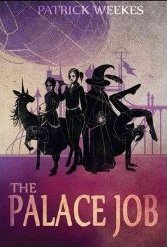 Since I was terribly disappointed in that steampunk book that I reviewed last week, I thought I’d check out something that’s not part of my usual reading repertoire but which one of my all time favorite authors, Jim Butcher, spoke about at a Q&A I went to. That would be Brandon Sanderson’s Mistborn trilogy.
Since I was terribly disappointed in that steampunk book that I reviewed last week, I thought I’d check out something that’s not part of my usual reading repertoire but which one of my all time favorite authors, Jim Butcher, spoke about at a Q&A I went to. That would be Brandon Sanderson’s Mistborn trilogy.
I got myself a sample from our friendly neighborhood Amazon.com Kindle store and then I immediately bought the trilogy. Not just Mistborn, the first book, but the whole trilogy. It has the feel of a far, far dystopian future mixed with the more traditional swords & steeds fantasy.
The book revolves around two Mistborn skaa called Vin and Kelsier. Mistborn refers to people who have “supernatural” (in quotes because it isn’t really supernatural, but not everyone has these traits) abilities fueled by the burning of ingested metals (pewter for strength, tin for enhanced senses and up to 8 others). Most people only have the ability to burn one metal (pewter burners are call Thugs, tin burners Tineyes) but those who can burn more than one metal are called Mistborn.
These abilities are supposed to be relegated to the nobility, but Vin and Kelsier are, as mentioned skaa. Skaa are peasants. Well, serfs in the old Russian tradition, really. They have no rights, are worked to the bone and the nobles can take advantage of them in any way they wish. Women can be used in the most vile of ways and must be killed afterwards, lest the aforementioned Mistborn abilities get passed on to a bastard.
Not all nobles are as careful as they should be, so there are a whole slew of skaa who can burn one metal, and a few who are Mistborn. Most of these people are thieves and conmen, which sounds like a bad thing until you realize that they target mostly noble houses. And trust me, in this world, that isn’t a bad thing.
Kelsier is our lead Mistborn and he recruits a bunch of single metal burners (I think there’s a term for these folks, but I can’t remember what it is) and Vin to pull a job. They’re going to bring down the Lord Ruler, the despot who have ruled over them for around a thousand years.
This is a long game, a year or more in the making. Kelsier has a definite plan but it’s also clear that he’s keeping a good portion of that from his fellow thieves. Kelsier gets his fellows to quietly raise a skaa army from those who aren’t already beaten into submission from a thousand years of grueling and intensive labor. It’s a small army.
He himself manages to start a war between the noble houses by using his Mistborn abilities to attack them in their keeps. Since only nobles are supposed to be Mistborn, they all think that the others are attacking them. Its almost beautiful how well Kelsier plays them.
While doing that, he trains Vin, who had been a young and female street urchin who was just trying to survive and not be raped. Vin transforms from a suspicious, rather mousy kid to a suspicious, talented Mistborn who can act well enough to infiltrate the nobility as a part of their long term plan.
This book was really, really good. I’m not usually one for the more traditional sort of fantasy. I like my Harry Dresdens and my Jane Yellowrocks with their screw you attitudes, cars and destructive tendencies. 😀 That said, this book was amazing and I will definitely be reading the other two books. I’ll have to take a break in between however because as good as this book is, it is a long and chewy read.
I can’t recommend this enough, especially because I didn’t see the ending a mile away as I tend to do with a lot of books and movies. I like a writer who can keep me guessing, or who can at least write well enough so that if I do see the end coming, I’ll still be happy I read the book.
Sanderson does a great job with the characters, showing them grow and change over the time of the book. His world building could have been a little better, but I think that in the context of the book (meaning the Lord Ruler essentially writing history), it works well. I’ll be interested to see where the next two books go. Rating: A+

